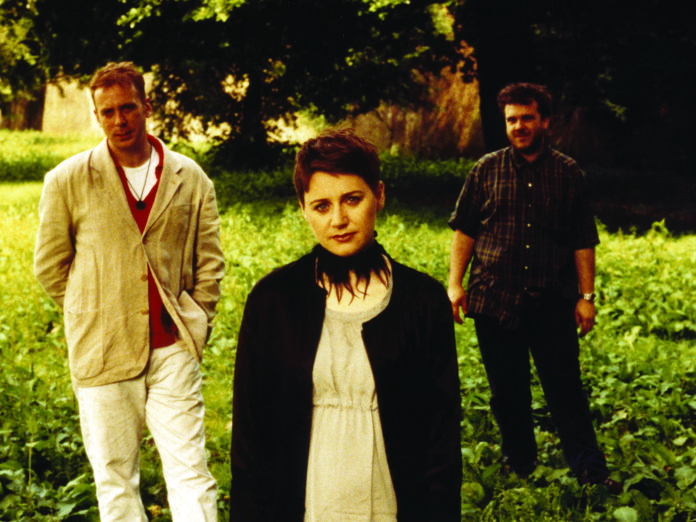Remastered vinyl reissues of the trio’s final two albums
Remastered vinyl reissues of the trio’s final two albums
NEIL YOUNG IS ON THE COVER OF THE NEW UNCUT – HAVE A COPY SENT STRAIGHT TO YOUR HOME
It was received at the time with bewilderment and foreboding akin to that which might be prompted by the ravens fleeing the Tower of London: Cocteau Twins leaving 4AD. It wasn’t just that the Cocteaus had, more than any other act, epitomised 4AD’s singular and influential aesthetic, it was that they appeared on the verge of an unlikely accession to genuine superstardom. 1990’s Heaven Or Las Vegas had been widely, and correctly, hailed as a classic. The accompanying US tour had filled ballrooms, theatres and – in a booking which seemed both hilariously incongruous yet weirdly apposite, given the album’s dazzle and shimmer and indeed title – the Aladdin Hotel in Vegas itself (wedding venue of Elvis and Priscilla Presley, among much else).
Behind the scenes, however, things were unravelling. The Cocteaus’ relationship with 4AD had become strained, as had the relationship between guitarist Robin Guthrie and singer Elizabeth Fraser. Unhelpful quantities of drugs were being consumed. The Cocteaus were dumped by 4AD in 1991, and Guthrie and Fraser split not long after. But the group somehow held together and signed to Fontana, for whom the Cocteaus made these two albums, now reissued – and/or welcomed home – in 140g vinyl by 4AD (in the US, at least; everywhere else we get them courtesy of Proper and UMR).
There was clearly every reason why 1993’s Four-Calendar Café could/should have been a disappointment at best, a disaster at worst: first major-label album, follow-up to a masterpiece, band barely on speaking terms, add cocaine, await calamity. But against these considerable odds, Four-Calendar Café is a marvel. For all the upheaval attending its creation, it sounds a pretty natural successor to Heaven Or Las Vegas, the Cocteaus apparently continuing to realise that they could stay just as pretty while becoming less opaque. It’s riddled with tunes that nobody’s milkman would have difficulty whistling, conveying Fraser’s most audible and least mistakable lyrics to date (on the gorgeous trundle of “Bluebeard”, which sounds about as close as the Cocteaus were ever likely to get to a country song, Fraser is perceptibly casting an eye sideways towards Guthrie as she trills “Are you the right man for me?/Are you safe, are you my friend?”).
Guthrie later claimed that half of Four-Calendar Café was made while he was still taking drugs, half after he’d emerged from rehab, and that the darker, gloomier tracks were actually a product of his newly acquired sobriety. It is to the album’s credit that it’s hard to tell which ones Guthrie thought were which. “Squeeze-Wax” is one of the more obviously ecstatic lullabies in the Cocteaus’ canon, and seems straightforwardly addressed by name to Guthrie and Fraser’s young daughter, Lucy – but the eternal tremulous frailty of Fraser’s voice freights something of love’s terrors as well as its delights. Similarly, “My Truth”, which presents as quite the fluffy meringue of a thing, is laden with Fraser’s dogged memos to self about how “You can work through the pain/And come to peace”.
If Four-Calendar Café seemed, then, a considerable advance in difficult conditions – it hit Top 20 in the UK, and made the lower reaches of the Billboard 100 in the US – then 1996’s Milk & Kisses suggested a sounding of the retreat into the Cocteaus’ comfort zone. The arrangements conjured by Guthrie and bassist/keyboardist Simon Raymonde are monumental (with due recognition that the influence always went both ways, opening track “Violaine” recalls The Cure at peak stadium pomp). Fraser’s vocals, though certainly more discernible than they were during the Cocteaus’ earliest giddy glossolalia, shrunk somewhat back into the palatial confections enveloping them. (“This time,” Fraser drily told one interviewer, “I wasn’t trying to make a point or use it as therapy.”)
Nevertheless, if Milk & Kisses isn’t quite the post-punk Shoot Out The Lights or Rumours that Four-Calendar Café was, it was nevertheless unabashed in places. “Rilkean Heart” is Fraser’s grateful yet regretful paean to her recent relationship with Jeff Buckley. The album’s peak, “Half-Gifts”, in which Guthrie’s guitars duel gently with Raymonde’s queasy fairground organ, seems a meditation on broadly similar themes (“It’s an old game, my love/When you can’t have me, you want me”).
It seems regrettably likely that these albums will remain the last we hear of this bizarre and wonderful group. A 55-date reunion tour was booked in 2005, then unbooked when Fraser decided that she did not, on reflection, fancy it. But complaints about quantity should always be overruled by demonstrations of quality, and Four-Calendar Café and Milk & Kisses are a graceful, if inadvertent, farewell from an entity who still seem less like a rock group than they do some surreal natural phenomenon, existing just beyond the explicable.



